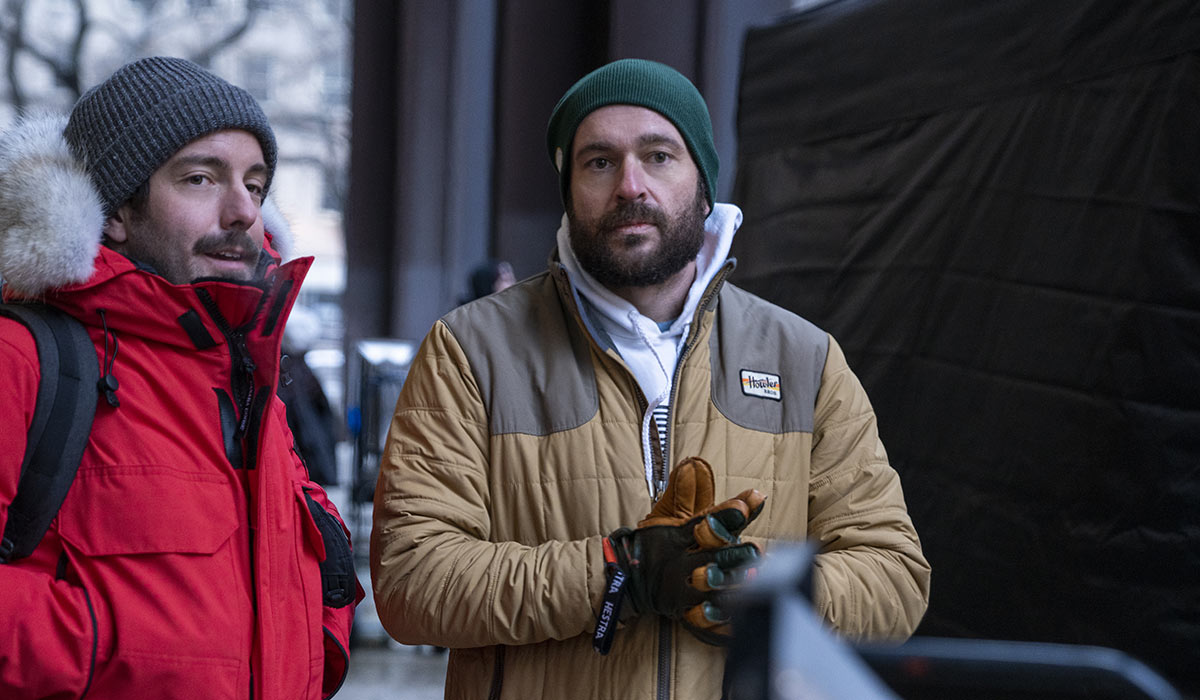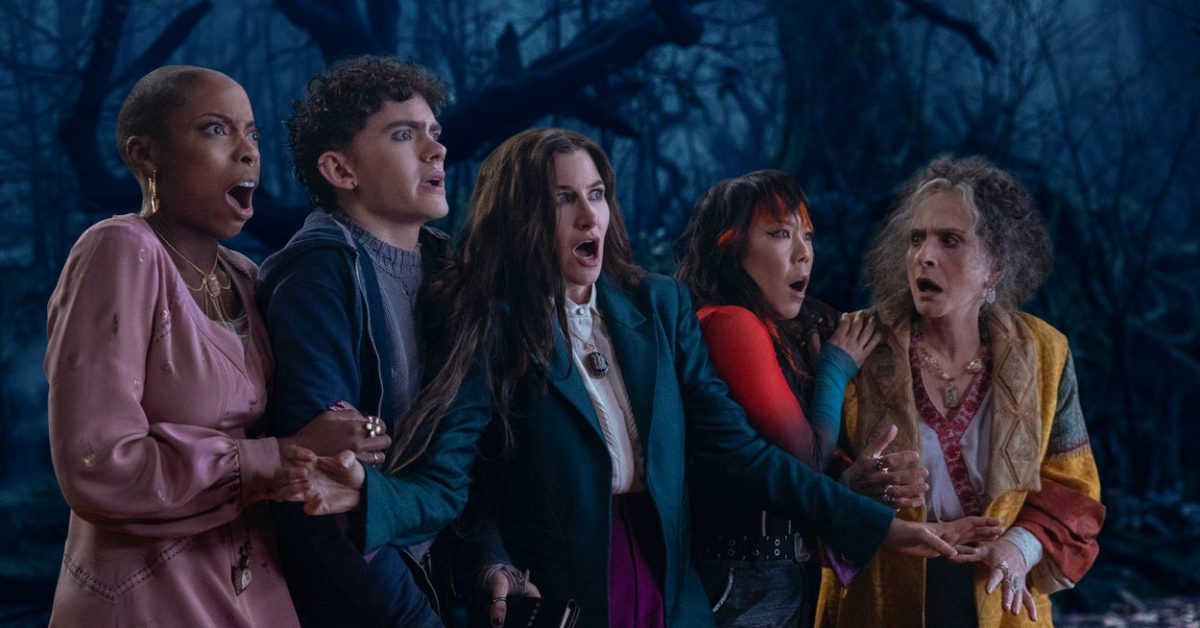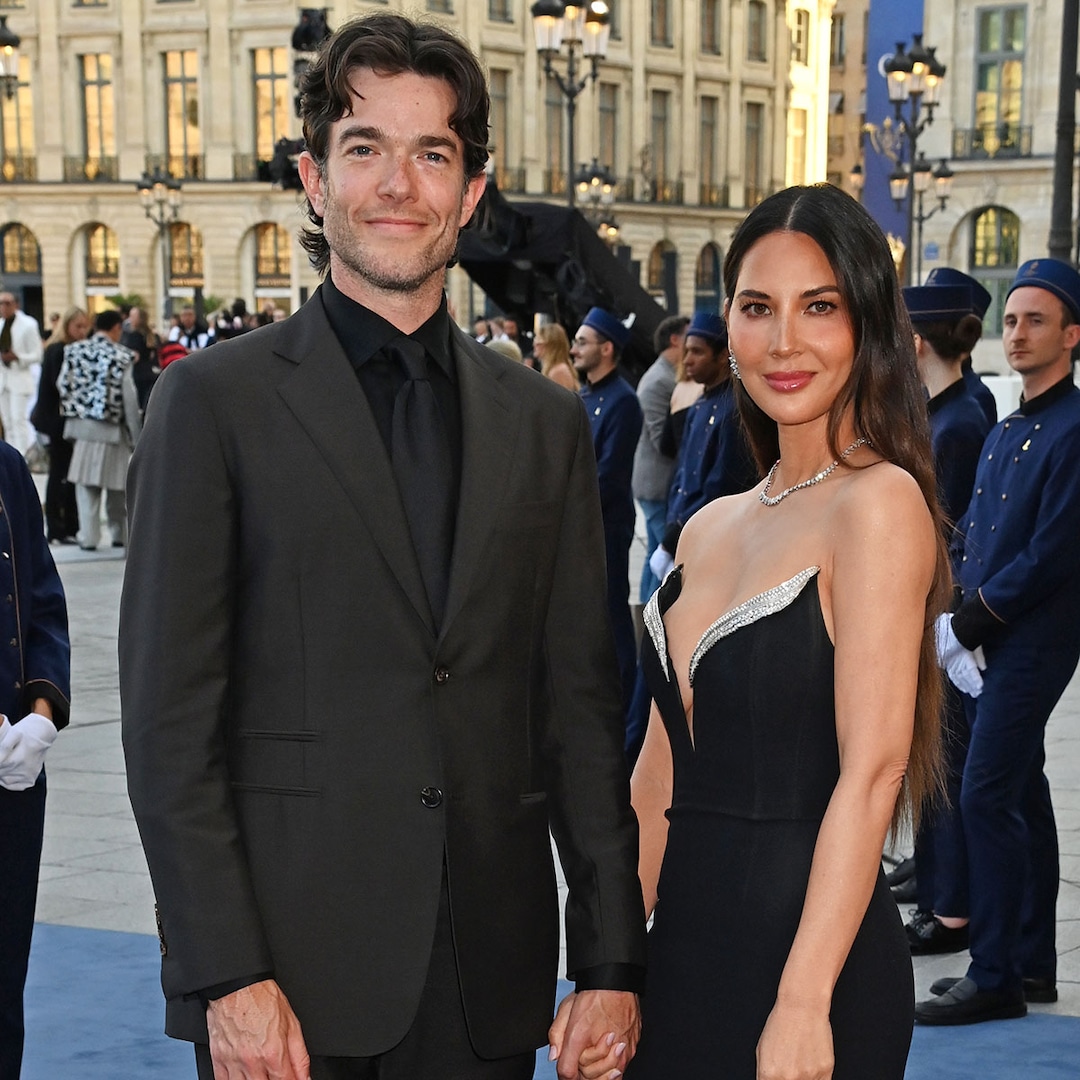
Patrick Somerville Cried For Joy After ‘Station Eleven’ Emmy Nods [Interview]
Jan 1, 2023
When writer and producer Patrick Somerville is making something, he wants it to give you that “Everlasting Gobstopper” feeling. To Somerville, that’s a project that is not only beautiful but emotionally true. That focus is one of the reasons his Emmy-nominated adaptation of Emily St. John Mandel’s novel “Station Eleven” connected with so many people.
READ MORE: Himesh Patel On His Emmy nod for ‘Station Eleven,’ the series that almost didn’t happen [Interview]
The HBO Max project was no easy task though. Narratively it hops, skips, and jumps over multiple time periods and delivers a vision of the future many viewers might not expect. Oh, and it’s centered around a fictional pandemic and shot before and during the world’s most recent one.
“They’re all hard, but this one is special,” Somerville says. “It’s the first one I was in charge of the whole time, all the way through. I think it’s the first time that I grew into being a good leader and knew how to do that. And I guess emotionally ‘Station Eleven’ just was deeply relevant to my life emotionally, but that was also true of the hundreds of people who also threw themselves at it. I’ve never been a part of a show that was more made with love and made with a spirit of, I don’t know, positivity and group collaboration. And it was really, really, really hard, sure. They always are, but this one felt special. So the fact that it’s also the one that broke through? I don’t know, that makes me feel really optimistic about trying to find a way to make something resembling art at a mass media scale.”
Somerville’s credits also include “The Leftovers,” “Maniac” and “Made For Love.” “Station Eleven,” however, has rewarded him with his first Emmy nomination for Outstanding Writing for a Limited or Anthology Series Or Movie. And while it didn’t land a Limited or Anthology Series nod, it earned six other nominations including Lead Actor (Himesh Patel) and Directing (Hiro Murai). And as Somerville noted during our conversation earlier this month, when he realized how much of his team was rewarded, well, it hit him hard.
_____
The Playlist: Congratulations on the Emmy nomination. What was your reaction to the news?
Patrick Somerville: Well, I was dropping my kid off at camp and fully expecting that “Station Eleven” would get zero nominations. I knew it was happening, but my phone was doing that thing. You know how you get text messages and it pops up on your screen, but it doesn’t show you the text?
Yeah.
I started getting quite a lot of text messages trying to drop her off. And I was like, “Oh, this is just all the people associated with the show saying, ‘Ah, what a bummer.’” But then there were so many of them. I just was like, “O.K., this is a lot.” And actually, the first one that I saw was Himesh and that was the one that felt impossible and it made me so happy. So, I started crying in the car with my daughter who was very confused about why I was crying, but I was crying out of joy. And it took 10 more minutes to get her out of the car, to look at my phone. And then I saw that Hiro was nominated and I was, but the show wasn’t. But I was so happy still for Himesh. And I was driving away and my producing partner, David Eisenberg, called me and I thought it was just to rehash. And I was like, “Ah, I wish the show got nominated, but Himesh is amazing. And me and Hiro got nominated.” And he’s like, “You know who else got nominated? Me, all the editors, Christian[ Sprenger], Dan [Romer].” So it was the best way to find out that so many deserving people exceeded what I guess the prediction expectations were and the show got recognized so well.
I mean, I’ve been talking to a couple of people in these categories and this was probably the most competitive limited series field in the history of it, just in an insane amount of great work. Does getting a writing nomination from your peers mean more to you in that respect? Or is it just any recognition from your peers is amazing?
I actually think professionally the most valuable thing ever is respect and recognition from peers. That’s always been more than money, more than prizes, more than anything, it’s that the people who do the same thing you do look over and say, “Hey, you did a really good job at this.” Nothing means more than that.
I know the history of the show that you guys had shot for over a month or done the first episode, I guess. And then the pandemic stopped you for a long time. Does it go without saying that this was this the hardest thing you’ve ever made? Is that a silly question to ask?
It’s not silly. They’re all hard, but this one is special. It’s the first one I was in charge of the whole time, all the way through. I think it’s the first time that I grew into being a good leader and knew how to do that. And I guess emotionally “Station Eleven” just was deeply relevant to my life emotionally, but that was also true of the hundreds of people who also threw themselves at it. I’ve never been a part of a show that was more made with love and made with a spirit of, I don’t know, positivity and group collaboration. And it was really, really, really hard, sure. They always are, but this one felt special. So, the fact that it’s also the one that broke through? I don’t know, that makes me feel really optimistic about trying to find a way to make something resembling art at a mass media scale.
It was a big ensemble cast. It was a big production. Everyone was very positive for it. That doesn’t happen on every show and, frankly, it doesn’t happen often. Was it just you and your producing partners picking the right people? Was it the material attracting said people? Where do you think that sense of purpose came from?
Well, I think when I first met Hiro and we first became friends and started talking about “Station Eleven,” in the very first conversation we had, what we ended up talking about a lot was process, which he’s really, really focused on. And I was learning more and more to be focused on. I told him this story about this scene from the season finale of “The Leftovers” from season two and the sequence between the time John realizes Evie’s on the bridge to the whole family being out there at the edge of the bridge and then [Ericka] ducking under that police barrier and running out to Evie and them having an exchange and then the score rising up. I had the privilege of helping to write that, but then to be in post watching Damon [Lindeloff] and our editor for “Station Eleven,” David Eisenberg, who’s now my producing partner, cut that and that night we were just crying, watching it over and over again. And then when the show came out, six months later, I just was crying again. And I cry every time. And I was telling Hiro that story and he recognized this thing. Once in a while, you stumble into these magic portals where every layer of the making of the thing is so emotionally true. It’s like an Everlasting Gobstopper of something beautiful. And that’s a rare thing, but that’s when the process is working right. It should feel that way. It should never lose its emotional power any step of the way. So, Hiro and I really connected on that idea and we entered into hiring all of the heads of department together in that same spirit of emotion and authenticity. And we cast in that way too. So, I think Hiro and I both agreed deeply on something important about how these things get made and we systematized it and built an institution around it. And I think that’s why we survived in the end because the right people were there to hold the line when we got into the very difficult work of making a show.
It sounds like you get very emotionally attached, as most people do, to the projects they worked on. How do you detach yourself once it’s over?
I mean, letting go is important. When you’re the showrunner, a maybe not healthy thing starts to happen where your own identity gets conflated with the show. It feels like you for a long time and you’re reaching out to 50 different people having one-on-one very intimate conversations with people about how are we going to make it through this like the way you would talk to people in your family. It stretches you as an individual unhealthily and then you need to let go and contract and go back to the normal world. But it’s slow. All those friendships and relationships? I don’t think those will ever go away. I don’t think there’ll be 10 text messages a night between 11:00 PM and 1:00 AM, but I think I love all those people and I think it doesn’t go away. And the other awesome thing is the show’s still there. So, every time I watch a three minute frame of “Station Eleven,” I remember the thousands of conversations that went into making that thing be that thing.
How important was it for you that critics or audiences to like it? Or are you, because it’s so personal to you is your attitude more of “We did it for us. It means something to me and that’s all that’s important“?
I always was very skeptical of that point of view. Whenever someone would say that to me, “I don’t care about the reviews.” I would say, “That’s f**king bullshit. Yes, you do.” But what I found in “Station Eleven” was I just was a few months ahead of everybody else in my inhabiting the feeling of the show where I just had to be, because I was out in front of everyone in the writing and in post and I just had been living it longer. I really had a sense, and I think someone wrote an article or somewhere in December, some place online that was like, “Ooh, bad time for this show to be coming out.” And I tweeted something about it too, which was like, “Not really. Doctor Eleven doesn’t care about time.” This is not very normal for me to be publicly out there being like, “Eh, it’s O.K.” But the reason I did that, I think, was because I just felt so certain the show was so caring and careful about how traumatized we all were, that it wasn’t exploitative. It was if anything, honest and hopefully healing. That’s not what a piece of art’s supposed to do, but I knew we were really careful with people’s hearts. And so I was like, I don’t know what’s going to happen. I do know that people need to and want to talk about feelings that they don’t have words for. And I also knew the show’s not medicine, it’s fun and joyful. So I thought we would break through and find our audience. I don’t think everyone thought that, but props to HBO for not trying to bury the show.
Oh, absolutely. And moving forward and I believe you’re making more stuff at HBO slash HBO Max.
Maybe.
Oh, maybe?
HBO Max doesn’t exist any… I can’t tell if it does or not. I’m not sure what we’re doing. But we certainly have more creative ideas we’d like to continue working with, but we need to take a minute and watch what happens with our network to know what we are going to do.
So there had been this report that you guys had two adaptations, “The Glass Hotel”and “Sea of Tranquility”, are those the projects that you’re waiting to find out what’s actually going on with HBO before you keep working on them?
A bit. We started developing “Glass Hotel” as a limited series. So we’re a little bit down the line, but we’re waiting to see when that would make sense with Danielle Deadwyler as the lead. And she’s blowing up, we’re trying to figure out how to make a pretty radical adaptation of Emily’s second novel. And we have an idea of how to make a Mandelverse that I think honors the spirit of “Station Eleven,” but doesn’t try to suck the life out of it by keeping going forward into a time that we don’t need to. “Glass Hotel” is set in the year 2012 before the pandemic.
Is that not your priority at the moment? Are you working on something else?
It was, we wrote some scripts. We pitched, we’re waiting. So it’s my priority creatively, but I don’t have any control. So, I am also over here busy developing the company that my producing partner, David Eisenberg, and I made coming out of “Station Eleven,” as well as with two other executives who played a huge role in making “Station Eleven” stuff, Stephanie Jacob-Goldman and Hillary Flint.
Is your go-to limited series now or do you want to return to traditional series?
We don’t have a go-to, but we want to learn how to make movies too. We love TV. We love really good TV. But “Station Eleven” was a lesson, I think in remembering how gigantic and how many years it takes to make a massively scaled television show and what that does to all the people involved. We really like movies too, because you can get in and get out that way. You can grow them at home. You can shoot them for a lot less and you can control the tone. And tone to David and I and Tractor Beam, that’s the name of the company, tone is the thing to us. How a thing makes you feel from frame to frame, it’s a delicate art. And I think we’re just looking for ways to be able to successfully play with tone again and again in the same way we were allowed to do with “Station Eleven.”
To be honest, as someone who’s covered the movie industry forever, I’m excited that anyone wants to work in the film business or the indie film business.
Well, if you know any high-net-worth individuals who want to invest five to 10 million dollars on a high-risk project, please send them our way.
Are you sure you don’t want to make it for $100,000? [Laughs.]
I’m not saying we couldn’t. I’m just saying it’s hard to keep the tone right.
Right.
Feature length on a guerilla budget.
It is. It’s very hard. But I guess my last question for you before I let you go is, are you excited about going to the Emmys? Is this something that you’re looking forward to?
I’m looking forward to seeing my friend Hiro and seeing my friends, Himesh and their partners, and having my wife come and see that the two and a half years of suffering back home she put up with while I was at work, at least led to something cool.
It did. It led to something very cool, man. Listen, congratulations on all this. Can’t wait to see you with Tractor Beam’s first film at Sundance in 2023 or ’24.
Hey, it’s possible. Well, I’d also like to add that my prediction is that Hiro, Christian, David, Brad, Dan, me, who else? Who’s the seventh? We’re all going to win.
But you know what? You’ve already won anyway…
That’s also true, but I’m making a specific prediction that we are going to win all seven of our Emmys because “Station Eleven” is dope as f**k.
“Station Eleven” is available on HBO Max.
Publisher: Source link
Every New Character Added To The MCU
Agatha All Along: Every New Character Added To The MCU Realizing that Wanda took all her power, Agatha's solution lies at the end of The Witches' Road, a series of trials that will reward those with what they are missing…
Oct 26, 2024
John Mulaney Shares Emotional Tribute to Wife Olivia Munn
"She shared her story to help anyone she could," John, who wed Olivia in July after three years together, continued. "According to the National Cancer Institute, in the week after Olivia shared the story of her breast cancer journey, there…
Oct 26, 2024
Eva Mendes Said There Have Been Times Where She’s “Regretted” Getting Cosmetic Work Done And Had To “Wait It Out”
Eva, who turned 50 this year, has previously said she would “never deny” getting cosmetic work done.View Entire Post › Disclaimer: This story is auto-aggregated by a computer program and has not been created or edited by filmibee.Publisher: Source link
Oct 25, 2024
Nicole Kidman Confirms Another Iconic AMC Ad Is “In the Making”
Nicole Kidman's 16-Year-Old Daughter Looks All Grown Up in Rare Public AppearanceWe come to this place for Practical Magic. At least, that’s a past role Nicole Kidman is channeling to tease that another AMC ad—like the movie theater chain’s original…
Oct 25, 2024










